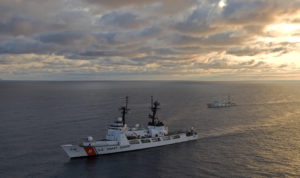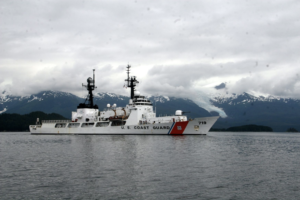“Mr. Morrison, your presence is requested on the bridge!” I was in the bowels of our cutter when I heard that pipe. The message was formal, but the tone was imperative. I left the engine room and ran as fast as I could. Our commanding officer pointed to the Soviet trawler several hundred yards away. The Soviets had thrown their ladder over the hull, but were in the middle of their overboard discharge. Fish guts gushed out and attracted a pod of walruses. They were required to stop for our inspection, but they weren’t going to make it easy for us.
I had not been taught the Russian for that command, but I picked up our radio receiver and tried the simple phrase: “trap nazad pozhaliusta”—ladder aft, please. Our captain looked skeptical. He did not believe I could learn Russian at any 30-day commercial school in Seattle. I held my breath. But then, the ladder was moved aft per my request. The captain took out his long green cigar and tipped it to me, as if in salute.
Soon, we were chugging over to the rusting, stinking Soviet trawler. My lieutenant led the boarding party. He was a beefy 30-something mustang—an officer who had risen from the enlisted ranks. I was also a former enlisted man, but he signaled to me that my college had disqualified me from any real fellowship. The lieutenant caught the ladder at the rise of our boat alongside the trawler and strongly heaved himself up the rickety ladder.
My turn: I leaped and caught the ropes and scampered up to avoid our boat crushing my leg against the trawler hull.
Thirty to 40 feet up, my lieutenant’s large orange bottom came to a full stop several rungs above me. I didn’t know why. Don’t look down, I had been warned. Vertigo. You’ll fall in. I couldn’t look up, so I stared straight ahead.
That proved a mistake. Some Boris and Natasha had taken advantage of whatever commotion had delayed things on deck. They were taking liberties on their rack inside. And I was an unwilling witness.
So, I closed my eyes and hung on. Seemed like minutes. My lieutenant then heaved himself over the railing and stood on deck. All ten of us in the boarding party had come to stand together. Then, we shed our survival suits. Visual orange and spongy, they were intended to keep us afloat and alive, insulated from the frigid Bering Sea waters.
The Russians looked at our expensive survival suits as if we were astronauts. My lieutenant introduced our party, leaving me for last. “Oh, and this is Lieutenant Junior Grade Morrison, our Russian interpreter.”
I gave them a snappy salute and tried a little joke: “Reebakii sveck stran so-you-di-nyee-tyez.” Fishermen of the World, Unite!
They picked up on the double entendre. Workers of the World, Unite! is the famed first line of the Communist Manifesto and the banner on every day’s issue of Pravda.
To the Soviet fishermen they were, it had meaning. To the Christians among them, it was a signal. Some of the crewmen and women smiled, knowingly.
As we went below, we saw our cutter disappear over the horizon. She was to do other inspections. For those, we would have to rely on Soviet English speakers to do the interpreting.
We went below and began our inspections. As I passed the bulkhead, I saw the large red axe bolted. I was reminded that our lieutenant was the only one of our ten-member party with a sidearm. How easy it would have been to disarm him, and we would all be taken hostage.
My task was to go over fish logs with a young Russian crewman, Vanya. He wiped his nose on the unraveling sleeve of his ratty gray sweater. His shoes looked like cardboard and were coming apart. Also coming apart was his zipper fly, held closed with a safety pin.
I was 33; Vanya was about 23. He showed his wounded pride. He looked us up and down. He did not like having to submit to our inspection. He went through the fish log with labored slowness.
“Bweestra, pazholiustra”—faster please—I said, attempting a tone of authority but without domineering.
Vanya stroked his ragged full beard and said, “Vwee nyay govoreetyay grammatnuh.” You are not speaking grammatically,he said, almost defiantly.
“Ya znayoo, no vwee ponumayetyay. Ee eta ZAKOHN.” I know that, but you understand and this is the LAW!
If they had a serious infraction of America’s Fishing Conservation Zone regulations, we had the authority to arrest this ship, impound its catch, and escort it into Kodiak Harbor for adjudication.
No Soviet captain could take that chance. But these folks were the people who invented the “rule book slowdown” that had long been a feature of labor conflicts in Detroit. That’s what Vanya was treating me to now.
Meanwhile, our lieutenant proceeded to go through the freezer hold below. Tons of frozen fish had been stacked up in huge cardboard boxes. I found him and reported that I had finally gotten through the fishing log with foot-dragging Vanya.
Lieutenant gave me a grunt of approval. I looked up and saw the 30-foot stacks of swaying boxes ill-stowed above us. If the ship should lurch, what would happen if a ton of frozen flounder crushed us? No Purple Heart for us, to be sure.
The noon hour had arrived. We were finished with our hours of inspections. The Soviets invited us to a lavish lunch.
We ten Coasties assembled in the crew’s dining area. Some of their glasses were cracked and not entirely clean, but they had obviously gone to great trouble for us. They even offered us caviar. Some of my brother officers did not like it, but I tried to signal that it’s a delicacy and an honor to us.
Seated at tables, the Soviet captain began with a vodka toast to George Washington. I was uneasy. I knew where this was headed. We drank. Next, he offered a toast to Lenin, whose jaundiced profile was displayed on their smokestack.
I wanted no scene. No trouble.
But I couldn’t toast bloody Lenin. So I struggled, fingering my glass on the table. “Faktee ee Aktee Lenina znameneetyay.” The facts and deeds of Lenin are well known, I said, praying I had preserved conscience and avoided an international incident. They seemed appeased.
After an expansive meal, my lieutenant took a seat at six o’clock in the circle afterward. Their Soviet captain sat at 12 o’clock, with other seats arranged clockwise.
Sitting just outside the circle, to their captain’s left, was the KGB officer. He had a chalky complexion, thinning hair, and wore rimless glasses. He never looked at us, but all of those in the circle looked at him before they spoke to us.
After an hour of back-and-forth, I was thrilled. My language skill was building by the minute. Oh, so that’s how you say that in Russian.
My lieutenant then turned to me, softening his usual attitude. He never said well done, but he seemed satisfied with my performance. He told me he had some paperwork to complete, but urged me to stay and continue the talks—“razgovor,” as they say.
My lieutenant left his seat—at six o’clock of the conversational circle. Our Soviet hosts instructed me to sit in the seat he had vacated. Why in that specific seat? Was this being recorded?
We talked on for nearly an hour. The Soviet captain led the discussion. Finally, he asked me if I had studied in Soyuz—the Union. They referred to USSR only as Soyuz, as we may refer to the States.
I said no. He then pursued me. Then how did I learn so much about Soyuz? Attempting to get out this line of questioning, I said simply, “I read a lot.”
That only opened me up. “Which writers have you read?”
Trying to avoid tripping, I listed Tolstoy, Dostoevsky, Chekhov, Turgenev—all authors I knew the Soviet regime had approved.
Unsatisfied, the Soviet captain pressed me. “Which Soviet-era writers have you read?”
I blushed. And sweated.
I blurted out: “Sholokov, Yevtushenko, and others.”
Those Soviet hacks would not suffice with them.
The Soviet captain smiled through stainless steel teeth:
“SOLZHENITSYN, eh?”
Solzhenitsyn the banned. The exiled. The Nobel Prize laureate. Solzhenitsyn had told all. Soyuz was “an empire built on bones.” There was the Gulag, after all.
Solzhenitsyn had led me to Christ. I could not deny him without denying Christ, too. One word of Truth can move the World, the dissident writer had taught me.
I tried to reply matter-of-factly.
“Da, Solzhenitsyn. On tozhay.” Yeah, him too.
Further, he pressed me.
“Skolka?”How much of Solzhenitsyn have you read?
I tried to look at him straight in the eyes. And speak without a tremor. I almost spat out the word.
“Fsyo.” All of him.
The Soviet captain looked to the KGB officer to his left.
Then, he signaled to the rest of the crew members seated around the clock. Each one denounced Solzhenitsyn in turn. It was as if the KGB had poked each crew member in the ribs and whispered, “This is when you sound off, you bastard!”
Around the clock, they spoke up.
“He is a spy.”
“He worked for the Germans in the Great Patriotic War.”
“He is crazy.”
“He is a Jew.”
I suppressed a laugh at that one. Yeah, lots of Jews spied for the Nazis in World War II.
“He left his first wife.”
“You Americans are welcome to him.”
“He’s a malcontent.”
Of course, their rote denunciation of Solzhenitsyn only confirmed every word of the millions of his that I had read.
The KGB officer never spoke. He never made eye contact with me. But once, furtively, he gave me a sideways glance.
I looked into his arctic blue eyes and saw into the soul of death.
But I was relieved that my naming the forbidden name had not resulted in violence. I remembered the red axe.
At that point, I only wanted to get out of there. In Russian, you don’t go to Russia, you go into Russia. I felt it—enveloped in its deadly grip.

Minutes later, we were on deck. I was relieved to see the beautiful white hull, our emblazoned blue and orange racing stripe, and her rakish bow as our US Coast Guard Cutter Boutwell hove into view.
In the middle of the Bering Sea, we Boutwells were America.
We suited up orange again. And I prepared to go over the side to our waiting small boat. I remembered what my Greenpeace friends had asked me to say to the Soviets.
“Akh, nah-obarote, spaceetyeh kitov!”By the way, save the whales.
Their captain laughed. In English, he said,“We know wot you mean. But you kent save whales’ souls. Only peepul khaff souls.”
I looked up at the smoke-stained profile of a jaundiced yellow Lenin on the red stack.
Any religious thought is unspeakably vile, the Father of the Oktober Revolution had said.
Back in the wardroom of the Boutwell, my brother officer Craig said to me, “Morrison, you shoulda been with us. They were asking for you. They said you were the best interpreter they’d had out here.”
I was thrilled to hear that. Finally, somebody appreciated my skills.
Then, sinking down in my armchair, I said to myself, “Idiot! That means the KGB knows your name. Would you be happy if the Great White Shark had your scent?”
It was then I realized I had had my own Red Oktober.







 Sponsor a student for Christianity & National Security 2024
Sponsor a student for Christianity & National Security 2024